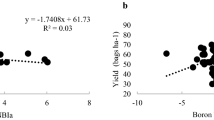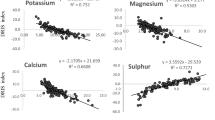Abstract
LIEBIG, in enunciating his mineral theory of the nutrition of crops in 1840, advanced the view that simple plant analysis would suffice to provide the data to determine the mineral requirements of crop plants and the amounts of mineral nutrients necessary to add to the soil to make good shortages due to removals by crops.
This is a preview of subscription content, access via your institution
Access options
Subscribe to this journal
Receive 51 print issues and online access
$199.00 per year
only $3.90 per issue
Buy this article
- Purchase on Springer Link
- Instant access to full article PDF
Prices may be subject to local taxes which are calculated during checkout
Similar content being viewed by others
References
Bennett, J. P., Univ. California Agric. Expt. Stat., Circ. 321 (1931).
Roach, W. A., Imp. Bur. Hort. and Plant. Crops. Tech. Comm. 10 (1938).
Thornton, S. F., Conner, S. D., and Fraser, R., Purdue Univ. Agric. Expt. Stat. Circ. 204 (Revised) (1939).
Lagatu, H., and Maume, L., Ann. L'école nationale d'agric, Montpelier, N.S., 22, 4, 257 (1924–33).
Thomas, W., and Mack, W. B., Penn. State Coll. Bull. 378 (1939).
Stewart, R., Imp. Bur. Soil Sci. Tech. Comm. 25 (1932).
Morgan, M. F., Conn. Agric. Expt. Stat., Circular 127 (1939).
Crowther, E. M., J. Roy. Agric. Soc., 97 (1936).
Author information
Authors and Affiliations
Rights and permissions
About this article
Cite this article
WALLACE, T. Diagnosis of Mineral Deficiencies in Crop Plants. Nature 155, 444–446 (1945). https://doi.org/10.1038/155444a0
Issue Date:
DOI: https://doi.org/10.1038/155444a0
Comments
By submitting a comment you agree to abide by our Terms and Community Guidelines. If you find something abusive or that does not comply with our terms or guidelines please flag it as inappropriate.



